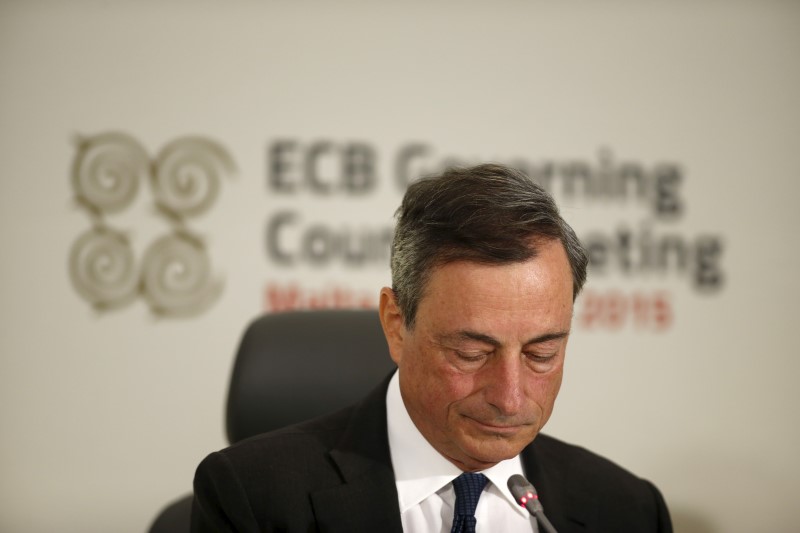Investing.com – European Central Bank (ECB) Mario Draghi painted a more upbeat picture of the euro zone economy, but insisted that current accommodative monetary policy was still appropriate as risks remained tilted to the downside and clarified that the ECB was not discussing an exit strategy.
Earlier, the ECB announced no changes to interest rates or its asset purchasing program and repeated its expectations that rates would “remain at present or lower levels for an extended period of time, and well past the horizon of the net asset purchases.”
They also confirmed that those purchases would continue at the new monthly pace of €60 billion ($65.4 billion) until the end of December 2017, “or beyond, if necessary”.
Upbeat, but cautious, outlook
However, Draghi did note the general improvements:
“Incoming data since our meeting in early March confirm that the cyclical recovery of the euro area economy is becoming increasingly solid and that downside risks have further diminished,” he said.
Regardless, Draghi remained cautious on future developments, stating that “the risks surrounding the euro area growth outlook, while moving towards a more balanced configuration, are still tilted to the downside and relate predominantly to global factors.”
To justify that current accommodative policies were still warranted, Draghi pointed out that, while headline inflation is expected to rise in April, it will then “hover around current levels until the end of this year.”
He also indicated that “measures of underlying inflation remain low and are expected to rise only gradually over the medium term.”
“To sum up, a cross-check of the outcome of the economic analysis with the signals coming from the monetary analysis confirmed the need for a continued very substantial degree of monetary accommodation to secure a sustained return of inflation rates towards levels that are below, but close to, 2% without undue delay,” Draghi summarized, calling once again on governments to step up structural reforms and intensify the implementation of fiscal policies which are more growth-friendly.
ECB not discussing exit strategy for removal of accommodation
In the question and answer period, Draghi confirmed that members of the ECB have not discussed exit strategies.
After an initial bounce on the back of the upbeat outlook, that remark sent the euro lower again, trading below levels seen ahead of his speech.
While Draghi continued to field questions, at 9:14AM ET (13:14GMT), EUR/USD was trading at 1.0870 from around 1.0890 ahead of the conference, while EUR/GBP was at 0.8436 from 0.8445 earlier.
Meanwhile, European stock market continued to trade lower. The benchmark Euro Stoxx 50 lost 0.29%, France's CAC 40 dropped 0.23%, Germany's DAX fell 0.12%, while London’s FTSE 100 traded down 0.54%.
